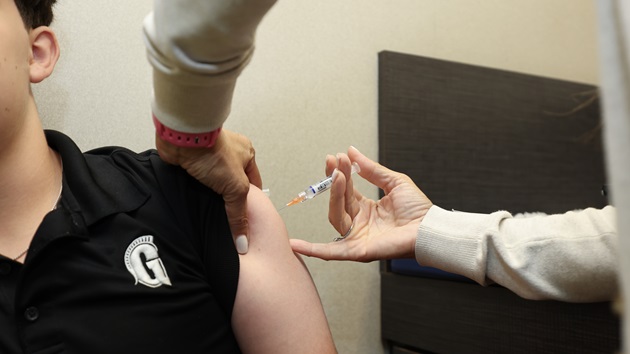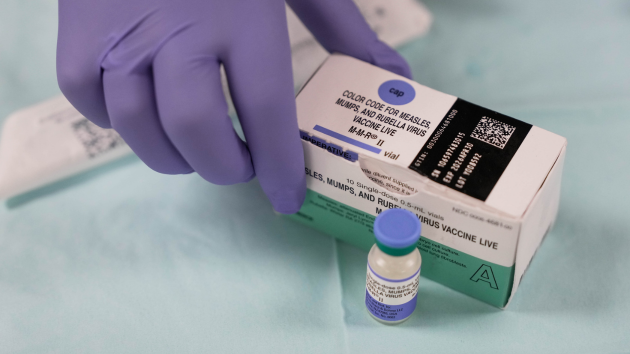Three things to know as new study emphasizes need to give kids peanut butter at a young age
Written by ABC Audio ALL RIGHTS RESERVED on May 30, 2024
(NEW YORK) — A new study is shedding more light on the importance of exposing kids to peanut products at a young age to help reduce the risk of an allergy later in life.
The study, led by the National Institutes of Health’s National Institute of Allergy and Infectious Diseases and published Tuesday, found feeding kids peanut products, like thinned peanut butter, regularly from infancy to the age of 5, was associated with a 71% decrease in the rate of peanut allergy among adolescents.
According to the study, a child exposed to peanut products by six months of age has a 75% reduced risk of having a peanut allergy by age 5, and by age 12, that child is four times less likely to develop a peanut allergy.
In addition, the reduced risk from early exposure is maintained even if a child stops eating peanut products regularly after the age of 5, according to the study.
The findings build on existing research showing that early introduction of potential food allergens reduces the risk of developing an allergy later in life, contrary to what doctors recommended in the 1990s and early 2000s. At that time, the recommendation was to wait until children were older to introduce peanuts and other allergens.
Large studies have since shown that waiting actually increases the risk a child would develop allergic reactions.
Dr. Jeanne Marrazzo, director of the NIH institute that led the study, said the new findings show that early exposure to peanut products provide “lasting protection” for kids.
“If widely implemented, this safe, simple strategy could prevent tens of thousands of cases of peanut allergy among the 3.6 million children born in the United States each year,” Marrazzo said in a statement announcing the study’s findings.
Peanut allergies are one of the most common food allergies, affecting nearly 2% of adults and kids in the United States, according to the American Academy of Allergy Asthma & Immunology. Allergic reactions to peanuts can be life-threatening.
Here are three things for parents and caregivers to know about introducing peanut products to kids at a young age:
1. Some kids can be fed peanut products starting at 4 months old
Parents and caregivers should consult with their child’s pediatrician before exposing them to peanut-containing foods.
Guidelines from the NIAID say that a child with no eczema or food allergies can have age-appropriate peanut-containing foods freely introduced into their diet at home starting around 6 months of age.
If a child has severe eczema or an egg allergy, they should be fed peanut-containing foods only after consulting closely with a healthcare provider. The child’s doctor may choose to recommend allergy testing by a specialist before introducing peanut-containing foods to the child in a safe, controlled manner.
Peanut allergy testing is not required for a child with mild to moderate eczema.
They can have age-appropriate peanut-containing foods added to their diet around 6 months of age, according to the NIAID.
2. Make sure to thin out peanut products for kids
Dr. Wendy Sue Swanson, a Seattle-based pediatrician, told ABC News previously that parents and caregivers should make sure to thin out peanut products when first introducing them to infants.
“You want to just make sure that you’re creating a texture and a consistency that’s easy and safe for your baby,” Swanson said. “Making sure that if you’re using things like nuts or nut butters, that you’re just thinning those nut butters to a way that they’re not a choking risk.”
Parents could also mix a small amount — a quarter teaspoon — of peanut powder into purees like applesauce.
Kids under the age of 4 should not eat whole peanuts or peanut pieces as they are a choking hazard.
3. Look for symptoms of an allergic reaction in kids
Infants who have an allergic reaction to peanuts will likely show two different symptoms, either hives or vomiting, or both, according to Swanson. Other symptoms of an allergic reaction parents should also look out for include facial swelling, difficulty breathing, wheezing, diarrhea or passing out.
Symptoms will most likely present within minutes to two hours after a child consumes a peanut product.
Parents and caregivers should contact their child’s pediatrician if a mild allergic reaction such as a rash develops. If parents and caregivers observe any other symptoms beyond rash, they should dial 911 for immediate medical assistance.
Copyright © 2024, ABC Audio. All rights reserved.







